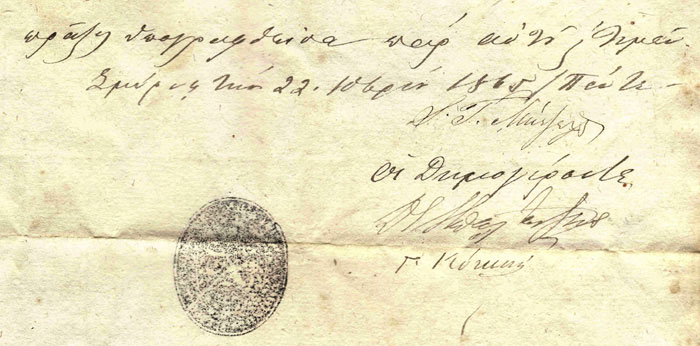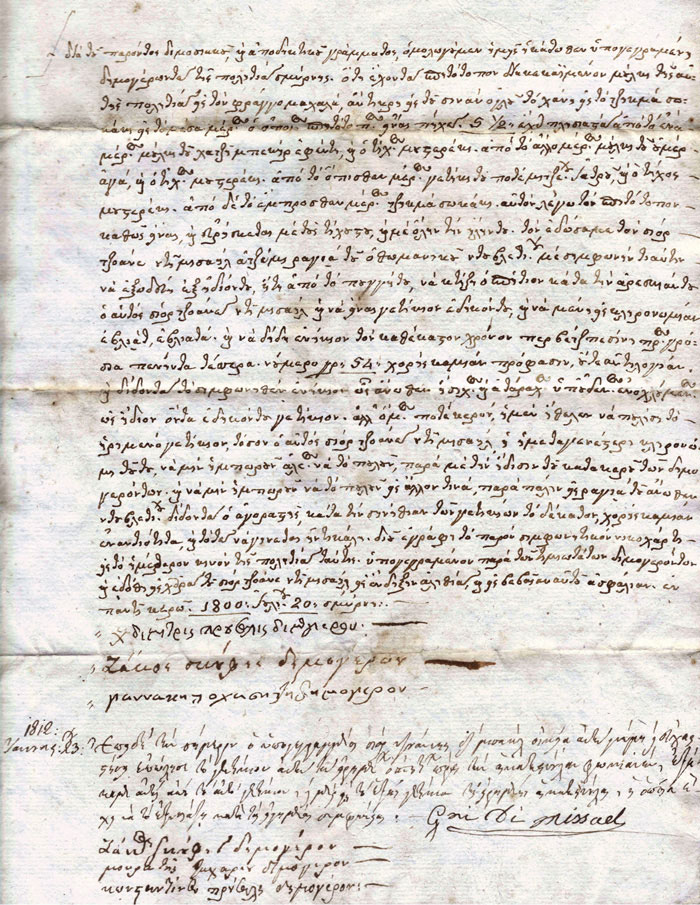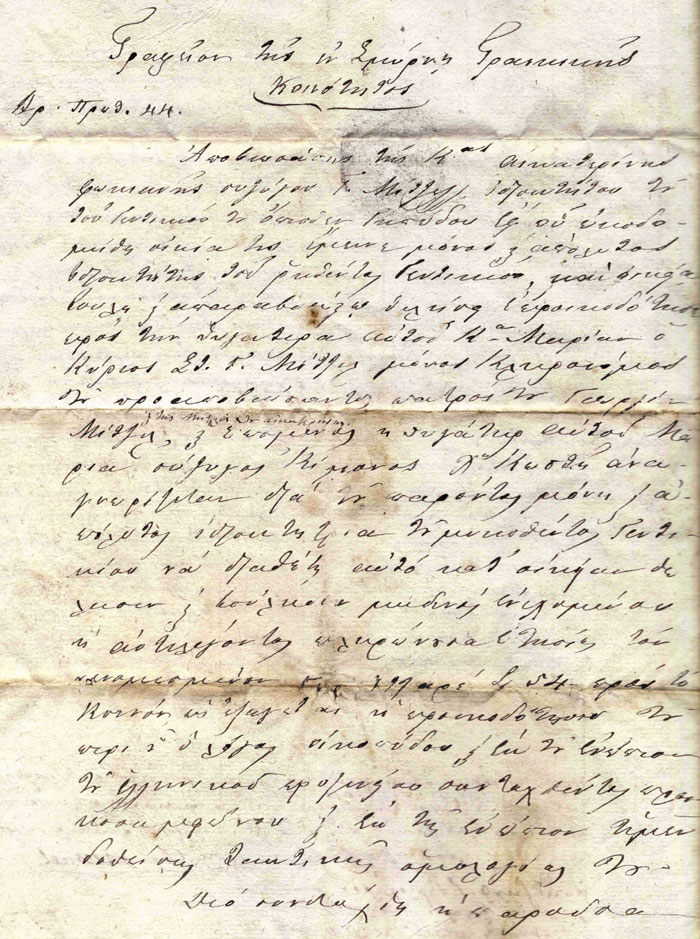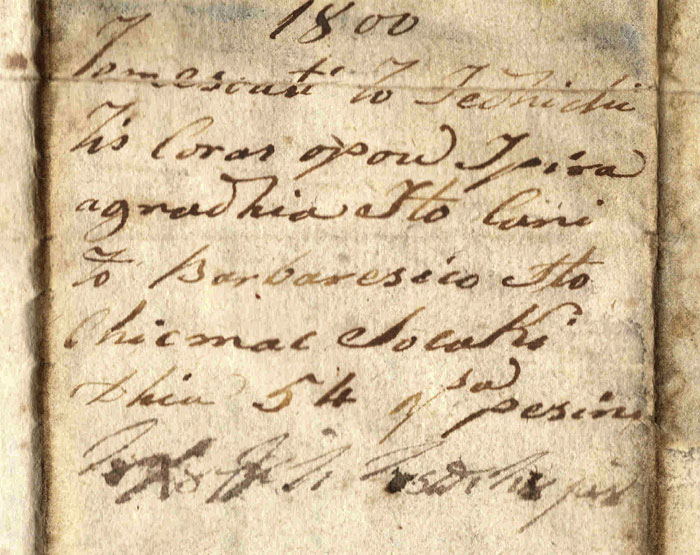By the present public and demonstrative letter, we the below signed peoples’ elders of the town Smyrna acknowledge that, having a homesite, ??? private property [mülk] in the same town, in the Frank [=Levantine] quarter, opposite of the Sinanoğlu inn [han] in Cikma [=“Exit”?] Street at the inner side, which homesite is 5 ½ cubits ???, and approaches on one side a private property of Haci Bekir Efendi, and the Moustaraki wall, on the other side a private property of Omer Aga, and the Moustaraki wall, on the back side a rented property(?) [gedik] of Dr Potemitzeos, and the Moustaraki wall, and on the front side the Cikma Street, this homesite I say, just as it is and exists, with its walls and the whole yard, we gave it to Sior [=Signor] Joana di Misael, acemi [=Persian?] subject [raya] of the Ottoman state, and by this agreement he is to cover the cost by himself, that is from his own purse, and build a house of his choice, he, the same Sior Joanas di Misael, and it is to be his own rented property(?) [gedik] and that of his heirs, evliat, evliat[a|o] [probably a turkish term meaning something like “if God so wishes”, maybe from evliya=saint]. And he is to pay rent each year pervadj pesini??? to the amount of fifty four piasters, numerically pi. “54”, without any excuse, nor dispute. And by paying the agreed rent as above, quiet and unperturbed, bothered by no one, as his his own rented property(?), but if at some time he would want to sell the mentioned rented property(?), he as well as a subsequent heir, they can’t sell it otherwise but only after learning of the ??? of the people’s elders, and they can’t sell it to no one but only again to another subject of the above state. The buyer, by giving one tenth without any contrariety, as is customary for rented properties(?), and then let happen ???. Therefore was the present contracting rental paper with our community of this town written, signed by the most honourable people’s elders, and it was given to the hands of Sior Joana di Misael as a token of truth, and for his certain assurance in all times. 1800 / July 20 / Smyrna / .
(signed) Hadji-Dimitris Prousalis [from Proussa/Bursa] people’s elder
(signed) Zakos Skoulis people’s elder
(signed) Giannaki Pohasidji people’s elder
1812 / January / 23
Because today the signed Jiannis di Misael by his own opinion and pleasure has sold his rented property(?) mentioned above to Ekaterini Fokiani [Phocaean], we ??? the same rented property(?), and it remains hereinafter a rented property(?) of the mentioned Ekaterini, who shall hold it and control it as of the mentioned agreements.
(signed) Gni di Missael
(signed) Zan??? people’s elder
(signed) Mouratis Zachariou people’s elder [Mouratis (Murat!) is a Christian name!!!]
(signed) Constantine Prousali [son/relativeof Hadji-Dimitris?] people’s elder
(signed) Hadji-Dimitris Prousalis [from Proussa/Bursa] people’s elder
(signed) Zakos Skoulis people’s elder
(signed) Giannaki Pohasidji people’s elder
1812 / January / 23
Because today the signed Jiannis di Misael by his own opinion and pleasure has sold his rented property(?) mentioned above to Ekaterini Fokiani [Phocaean], we ??? the same rented property(?), and it remains hereinafter a rented property(?) of the mentioned Ekaterini, who shall hold it and control it as of the mentioned agreements.
(signed) Gni di Missael
(signed) Zan??? people’s elder
(signed) Mouratis Zachariou people’s elder [Mouratis (Murat!) is a Christian name!!!]
(signed) Constantine Prousali [son/relativeof Hadji-Dimitris?] people’s elder
A contract [temesut] of 1800 between the Greek community council of Smyrna and Gianni di Missael, probably of Italian/Venetian origin. A plot in the Levantine quarter of Smyrna is rented(?) [gedik] to Gianni di Missael by the council. The contract is amended in 1812, when the rented property rights are sold to Ekaterini Fokiani, the wife of Gianni di Missael’s son(?) George. It is signed by Gianni di Missael in Latin script.
One of the signing members of the council has the first name Mouratis, which survives as a Greek surname up to now, and is probably the root of Joe Murat’s surname. The meaning of the name is unknown to me, but it probably has nothing to do with the Turkish name Murad.
One of the signing members of the council has the first name Mouratis, which survives as a Greek surname up to now, and is probably the root of Joe Murat’s surname. The meaning of the name is unknown to me, but it probably has nothing to do with the Turkish name Murad.
Red text indicates uncertainty - transcriptions, translations and analysis (larger text) courtesy of George Poulimenos, 2009
 |
Office of the Smyrna Grecian Community
Prot. Nr. 44
After the death of Mrs. Ekaterini Fokiani [Phocaean], wife of G. Mitsell and owner of the rented property(?) [gedik, a word found in old documents alongside with mülk] of the rear field, on which her house was built, there remained as sole and unconditional owner of the mentioned rented property(?), and of his own intention and inviolable will he endowed it to his daughter Mrs. Maria, Mr. St. G. Mitsel, the only heir of his father, who died before that (and of his mother Ekaterini), therefore his daughter Maria, wife of Kimon Hajji-Kostis [Kostis pilgrim to Jerusalem for the Hajj], is hereby acknowledged as sole and unconditional owner of the ??? rented property(?) and can use it as her own will and intention dictates, and nobody can ??? or contend it, and yearly paying the arranged G ?ilare of £ 54 to the Commons, as is derived the endowment of this plot and of the enclosed dowry contract, drawn up by the greek consulate, and by his ??? orderly concession given to us Therefore was the present deed drawn up, signed by him and us Smyrna 22 10ber [December?] 1865 / Five
(signed) St. G. Mitsell
The people’s elders
(signed) D I Baltadjis [Baltazzi?]
(signed) G Kokini
Prot. Nr. 44
After the death of Mrs. Ekaterini Fokiani [Phocaean], wife of G. Mitsell and owner of the rented property(?) [gedik, a word found in old documents alongside with mülk] of the rear field, on which her house was built, there remained as sole and unconditional owner of the mentioned rented property(?), and of his own intention and inviolable will he endowed it to his daughter Mrs. Maria, Mr. St. G. Mitsel, the only heir of his father, who died before that (and of his mother Ekaterini), therefore his daughter Maria, wife of Kimon Hajji-Kostis [Kostis pilgrim to Jerusalem for the Hajj], is hereby acknowledged as sole and unconditional owner of the ??? rented property(?) and can use it as her own will and intention dictates, and nobody can ??? or contend it, and yearly paying the arranged G ?ilare of £ 54 to the Commons, as is derived the endowment of this plot and of the enclosed dowry contract, drawn up by the greek consulate, and by his ??? orderly concession given to us Therefore was the present deed drawn up, signed by him and us Smyrna 22 10ber [December?] 1865 / Five
(signed) St. G. Mitsell
The people’s elders
(signed) D I Baltadjis [Baltazzi?]
(signed) G Kokini
Another contract, this time of 1865, between the Greek Community council of Smyrna and St[amatis|Stavros?]. G. Mitsell [=Mitchell], son of George Mitsell and Ekaterini Mitsell nee Fokiani. The same rented property [gedik] is given as a dowry to St. G. Mitsell’s daughter Maria, wife of Kimon Hajji-Kostis.
It is clear that the name Mitsell (Mitchell) is derived from di Missael.
Also, it is very curious that the rent stayed constant throughout 65 years at 54 piasters per year. Apparently there was no inflation at these times.
One of the signing members of the council is named D. Baltadjis. Maybe he is Demosthene Baltazzi?
It is clear that the name Mitsell (Mitchell) is derived from di Missael.
Also, it is very curious that the rent stayed constant throughout 65 years at 54 piasters per year. Apparently there was no inflation at these times.
One of the signing members of the council is named D. Baltadjis. Maybe he is Demosthene Baltazzi?
1800
Contract(?) [temesut] of the rented property(?) [gedik]
of the country|town where ???
agradhia(?) at the Barbaresco [=North African] inn [han] in Chikmal [Cicma?] Street for 54 ??? pesini [piasters?] ??? of my house
Contract(?) [temesut] of the rented property(?) [gedik]
of the country|town where ???
agradhia(?) at the Barbaresco [=North African] inn [han] in Chikmal [Cicma?] Street for 54 ??? pesini [piasters?] ??? of my house
Almost certainly the cover of the top series of documents, written probably by Gianni di Missael himself, because although it is in the Greek language with some Turkish words, it is written in the Latin script (Francochiotika).
A modern re-incarnation of Francochiotika is ‘Greeklish’, i.e. Greek written in the same script as English, and widely used in Greek language forums and e-mails. The reason for using Greeklish is the same as for Francochiotika: Most writers of Greeklish, mainly Greeks born or living outside Greece, while having perfect command of spoken Greek, have only limited knowledge of the Greek alphabet.
A modern re-incarnation of Francochiotika is ‘Greeklish’, i.e. Greek written in the same script as English, and widely used in Greek language forums and e-mails. The reason for using Greeklish is the same as for Francochiotika: Most writers of Greeklish, mainly Greeks born or living outside Greece, while having perfect command of spoken Greek, have only limited knowledge of the Greek alphabet.





